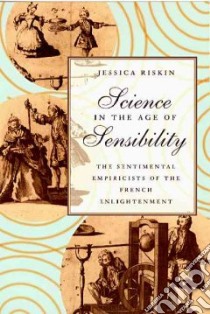Science in the Age of Sensibility - 9780226720791
Un libro in lingua di Jessica Riskin edito da Univ of Chicago Pr, 2002
- € 36.20
- Il prezzo è variabile in funzione del cambio della valuta d’origine
Empiricism today implies the dispassionate scrutiny of facts. But Jessica Riskin finds that in the French Enlightenment, empiricism was intimately bound up with sensibility. In what she calls a "sentimental empiricism," natural knowledge was taken to rest on a blend of experience and emotion.
Riskin argues that sentimental empiricism brought together ideas and institutions, practices and politics. She shows, for instance, how the study of blindness, led by ideas about the mental and moral role of vision and by cataract surgeries, shaped the first school for the blind; how Benjamin Franklin's electrical physics, ascribing desires to nature, engaged French economic reformers; and how the question of the role of language in science and social life linked disputes over Antoine Lavoisier's new chemical names to the founding of France's modern system of civic education.
Recasting the Age of Reason by stressing its conjunction with the Age of Sensibility, Riskin offers an entirely new perspective on the development of modern science and the history of the Enlightenment.
"[Riskin] has succeeded admirably in depicting a culture where labeling people as 'scientists' simply would not make sense. . . . In Riskin's stimulating and original book, Franklin features not so much as the hero who dramatically seized the lightening from heaven and the scepter from tyrants, but rather as the champion of a sensibilist approach to science. . . . System-building is conventionally said to be a key characteristic of the Enlightenment, yet for Riskin's sentimental empiricists such an approach represented the evil antithesis of their own philosophy, which was based on responding sensitively to nature's directives. Riskin convincingly argues that retrospective views were forged in the bitter debates between opposing camps: thus historians who decry the arid abstraction and determined individualism of the Revolutionary period are reiterating the rhetorical abuse purveyed by sensibilist critics."--Patricia Fara, Times Literary Supplement
Riskin argues that sentimental empiricism brought together ideas and institutions, practices and politics. She shows, for instance, how the study of blindness, led by ideas about the mental and moral role of vision and by cataract surgeries, shaped the first school for the blind; how Benjamin Franklin's electrical physics, ascribing desires to nature, engaged French economic reformers; and how the question of the role of language in science and social life linked disputes over Antoine Lavoisier's new chemical names to the founding of France's modern system of civic education.
Recasting the Age of Reason by stressing its conjunction with the Age of Sensibility, Riskin offers an entirely new perspective on the development of modern science and the history of the Enlightenment.
"[Riskin] has succeeded admirably in depicting a culture where labeling people as 'scientists' simply would not make sense. . . . In Riskin's stimulating and original book, Franklin features not so much as the hero who dramatically seized the lightening from heaven and the scepter from tyrants, but rather as the champion of a sensibilist approach to science. . . . System-building is conventionally said to be a key characteristic of the Enlightenment, yet for Riskin's sentimental empiricists such an approach represented the evil antithesis of their own philosophy, which was based on responding sensitively to nature's directives. Riskin convincingly argues that retrospective views were forged in the bitter debates between opposing camps: thus historians who decry the arid abstraction and determined individualism of the Revolutionary period are reiterating the rhetorical abuse purveyed by sensibilist critics."--Patricia Fara, Times Literary Supplement
Informazioni bibliografiche
- Titolo del Libro in lingua: Science in the Age of Sensibility
- Sottotitolo: The Sentimental Empiricists of the French Enlightment
- Lingua: English
- Autore: Jessica Riskin
- Editore: Univ of Chicago Pr
- Collana: Univ of Chicago Pr (Paperback)
- Data di Pubblicazione: 15 Dicembre '02
- Genere: SCIENCE
- Argomenti : Science France History 18th century Enlightenment France Sensitivity (Personality trait)
- Pagine: 296
- Dimensioni mm: 228 x 152 x 19
- ISBN-10: 0226720799
- EAN-13: 9780226720791


